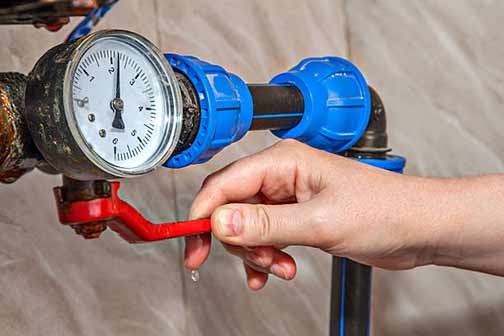
A plumbing emergency is any plumbing issue that can cause serious damage to your plumbing, home, and personal belongings, explains Campus Realtors. Plumbing emergencies may also prevent the normal use of some of the home’s plumbing fixtures.
Examples of plumbing problems that may be viewed as emergencies include:
- Burst pipes: A burst pipe can flood your home and cause extensive water damage
- Clogged and overflowing toilets: There is not only the potential for serious water damage, especially to your flooring, but this problem creates unsanitary conditions in your home.
- Sewer line backup: Poses the same problem as an overflowing toilet but to a higher degree.
- Water heater failures: Leaves your home without hot water, which can be a huge problem in winter or if have young children and elderly folks in the house.
- Gas leaks: This problem carries a huge risk of suffocation and death via gas inhalation, as well as, the possibility for destruction of personal belongings by fire.
While it is not possible to eliminate the risk of plumbing emergencies happening in your home, you can reduce the probability that they will happen. Also, when a plumbing emergency happens in your home, you can minimize its impact by acting quickly and intelligently.
How to prevent plumbing emergencies in your home
Inspect your plumbing on a schedule
Plumbing emergencies in your home rarely happen without warning. But because most homeowners don’t pay enough attention to their plumbing, they miss the telltale signs of the impending disaster. Inspecting your plumbing system on a schedule, and not when there are issues, will help you detect problems early and fix them promptly.
Maintain your plumbing
Small plumbing problems eventually become huge plumbing disasters. The timing of a plumbing repair plays a big role in the money you will spend to fix the problem. Maintaining your plumbing proactively rather than reactively is the best approach. This is true from a cost-saving perspective and to prevent plumbing emergencies in your home.
Upgrade aging components
Every feature of your plumbing has an expiration date. Also, the plumbing is constantly being attacked by dissolved minerals and other materials inside water, as well as, by the water itself. If aging and weak plumbing features are not replaced, they make the plumbing system fragile and susceptible to problems that can precipitate a plumbing emergency in your home.

By shutting the water supply you prevent more water from being added to the water that has already been discharged into your home.
How to prevent water damage during a plumbing emergency
In the event of a plumbing emergency in your home, the following steps will help you reduce the impact of the disaster.
Check for electrical hazards
Water and electricity do not make a very good combination. If there is any chance that the spilled water inside your home has come into contact with an outlet or electrical device, do not step into or touch the water. Shut the power supply to that part of the home or your entire house before attempting to salvage the situation. If you are not sure how to do this, it is better to call a local plumber and let them handle it.
Shut the water supply
This is the first step when you discover an unfolding plumbing emergency in your home. By shutting the water supply you prevent more water from being added to the water that has already been discharged into your home. To turn off the water, find the main water shut-off valve for your home and close it. It is often located in the basement, garage, or near the water meter. If the damaged plumbing fixture has a dedicated shut-off valve, close only that.
Remove all standing water
The sooner you get to this step, the less time the water will have to spread farther to damage your home. Mops and towels help to soak up excess water, but if you want to make quick progress, you need a wet/dry vacuum. Before removing the standing water inside your home, you want to move items that can be damaged by water out of the reach of the flood inside the house. Move all wet items outside or somewhere airy, to start drying them out.
Address the plumbing issue
After dealing with the most pressing problems, you may now pay attention to the cause of the plumbing emergency in your home. When doing this, keep in mind that your goal is not just to fix the damage to the plumbing but to prevent a repeat of the problem. Plumbing emergencies are often caused by layers of overlooked plumbing issues all of which must be solved if the problem in your home is to be addressed completely.
Lastly, you need an experienced emergency plumber to help you identify the immediate and remote causes of the plumbing emergency. Your preferred plumber should also be available at short notice to deal with unforeseen plumbing issues in your home. An emergency plumber will also help you create a maintenance plan that reduces the risk of plumbing disasters in your home.